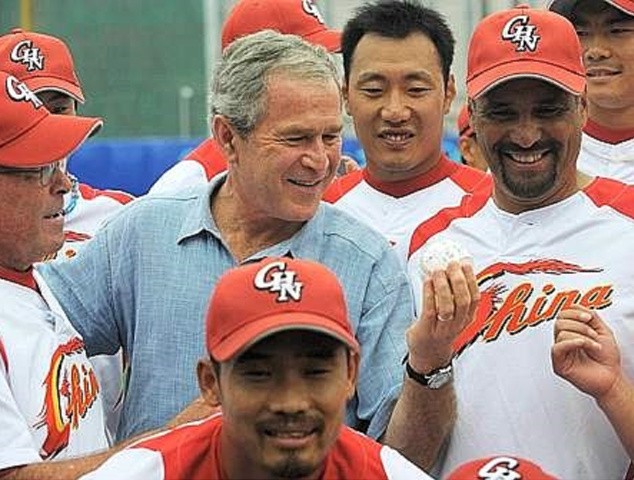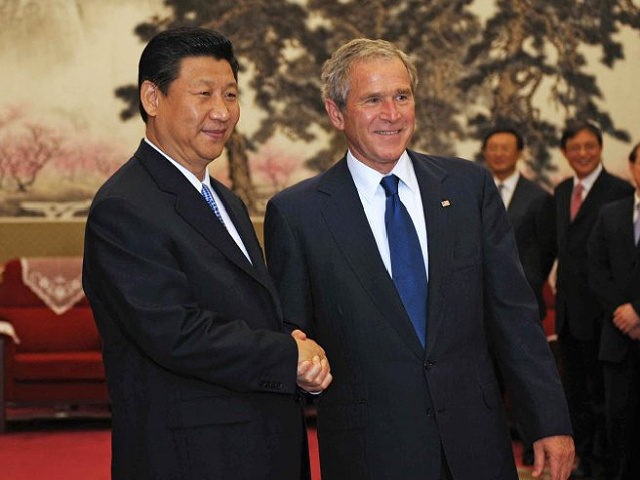China’s state-run Global Times published a summary of an interview with former President George W. Bush on Wednesday to discourage calls for a boycott of the upcoming 2022 Beijing Winter Olympics.
Opponents of the event note that China is the world’s largest and potentially most prolific human rights criminal, currently engaging in extreme repression of religion, free expression economic activity, and other basic indicators of free societies. Extensive evidence has led a growing number of countries in the free world, including the United States, to officially declare China guilty of genocide for the destruction of the Uyghur people of East Turkistan using mass sterilization, slavery, and concentration camp internments to stunt population growth in the region.
Given China’s recent history of abuse towards athletes — particularly the disappearance of tennis champion Peng Shuai over her accusation of rape against an Olympics official — those who support the Beijing Olympics boycott also argue that sending athletes to the Games places them at unnecessary risk of repression by the Chinese Communist Party. The Party itself confirmed those fears by warning last week that athletes could face police action if they express opinions that dissent from communist orthodoxy while in Beijing.
Most high-profile political leaders in the United States have not called for a boycott of the Olympics this year, but many of the few who have are Republicans. In an apparent attempt at persuading Republicans to embrace China as an Olympic host, the Global Times claimed on Wednesday that unnamed Chinese reporters had “dug out an interview with the then U.S. President George W. Bush” from 2008, when the president was in Beijing for that year’s Summer Olympics.
Bush attended a wide array of events in Beijing during the Games, taking friendly photos with American athletes participating in baseball, volleyball, swimming, basketball, and other sports. Bush notoriously dismissed human rights concerns in China and was largely absent from the global outrage surrounding Russian leader Vladimir Putin’s invasion and colonization of two regions of Georgia, South Ossetia and Abkhazia, which began on the first day of the Summer Games.

US President George W. Bush holds a signed baseball while posing with Chinese baseball team coach Jim Lefebvre (L) of the U.S. and members of the Chinese Olympic baseball team ahead of a practice 2008 Beijing Olympic Games baseball game between the U.S. and China at the Wukesong Culture and Sports Center Baseball Stadium in Beijing on August 11, 2008. (Photo credit should read MANDEL NGAN/AFP via Getty Images)
The 2008 Olympics preceded the massacre of Uyghurs in Urumqi, East Turkistan, in 2009 that served as a prelude for the mass construction of concentration camps and current ongoing genocide.
The Global Times did not publish any direct quotes from the alleged Bush interview or state with whom the former president did the interview. Instead, it paraphrased points that Bush reportedly made at the time.
“When asked about his decision to defy political pressure and attend the Beijing Games, Bush said he was looking forward to the visit, and that he was even a little excited,” according to the Times. “He noted that he and the U.S. respect the Chinese people, their history and tradition.”
“As US president, it is not only important to have good relations with China, but with the whole region, said Bush, noting that he does not deem diplomatic policies as a zero-sum game,” Bush allegedly said. “What I am concerned is that the US is becoming more isolated and worships protectionism, said Bush, noting that protectionism was bad for the US and the world’s economy.”
The Global Times also claimed Bush “told reporters that he had decided to decouple Olympics with politics” and that he was “showing the Chinese people his respect by attending the Olympics.”
While the Times failed to source the interview, the alleged remarks are consistent with statements that Bush issued to other outlets during the 2008 Games.
“I think you ought to look at the relationship as one of constructive engagement where you can find common areas, like North Korea and Iran,” Bush said in remarks published by Voice of America, “but also be in a position where they respect you enough to listen to your views on religious freedom and political liberty.”
The U.S. government outlet noted that Bush opted to attend a Christian service in China at a “legal,” Communist Party-controlled church. Legal churches are mandated to spread Marxism through their services and their clergy cannot freely preach the Gospel.
“It gave me a chance to say to the Chinese people, religion won’t hurt you, you ought to welcome religious people,” Bush said of his visit. “And it gave me a chance to say to the government, why don’t you register the underground churches and give them a chance to flourish?”
After the 2008 Beijing Olympics ended, Bush said the event “exceeded [his] expectations.”

A protester from the Uyghur community living in Turkey holds an anti-China placard during a protest in Istanbul, Thursday, March 25, against the visit of China’s FM Wang Yi to Turkey. (AP Photo/Emrah Gurel)
The Bush family has decades of historical ties to the Chinese Communist Party, dating back to when former President George H. W. Bush served as the top American diplomat in Beijing in the 1970s. In his new book, Red-Handed: How American Elites Get Rich Helping China Win, bestselling journalist Peter Schweizer details how the Bush family became close with former Chinese President Jiang Zemin, tasked with covering up the Tiananmen Square massacre, and furthered its relationship with the Party through business agreements.
Jiang himself, Schweizer revealed, praised the election of George W. Bush in 2000.
“The father of President [George W.] Bush, Bush Sr., came over to China many, many times and had many meetings with me in the seat you are now occupying,” Jiang said at the time. “We believe Bush Sr. will definitely push Bush Jr. to bring U.S.-China relations to a new level.”
“During the George W. Bush presidency, a new generation of Bushes began securing deals with Chinese officials,” Schweizer revealed. “Neil Bush, brother of the president, signed a contract with a Chinese company called Grace Semiconductor Manufacturing. Bush had no background in computing, but the firm paid him $400,000 a year.”
Neil Bush remains a regular contributor to Chinese state media.
Former Florida Gov. Jeb Bush also has ties to China that resulted in “at least nine Chinese nationals linked to Chinese government-connected front groups” helping his failed 2016 presidential run in some form, including donations to Super PACs.
China joined the World Trade Organization in December 2001, allowing it to become the second-largest economy in the world.

COMMENTS
Please let us know if you're having issues with commenting.